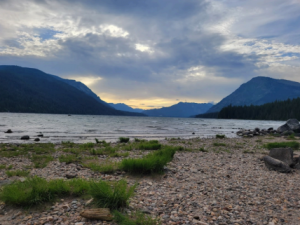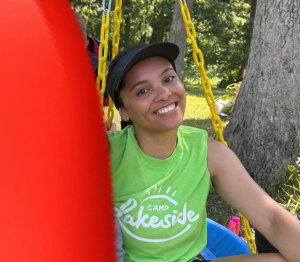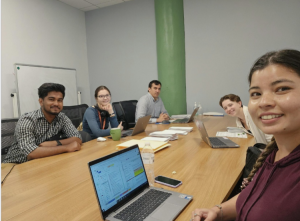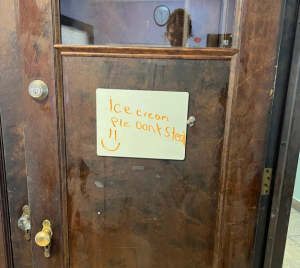 It’s hard to believe my summer at the Grunewald Guild is already coming to an end. These ten or so weeks have been so incredibly fulfilling, and I’m forever grateful for the vibrant and colourful community that the Guild fosters for all who visit. I’ve grown to appreciate the regular Matins and Vespers gatherings each day. It’s been cool to see how helpful that small bit of routine makes such a difference in my motivation. Taking that time at the opening and closing of each day to focus intentionally on grounding, appreciation, and reflection has helped me to better understand and learn from my time spent here.
It’s hard to believe my summer at the Grunewald Guild is already coming to an end. These ten or so weeks have been so incredibly fulfilling, and I’m forever grateful for the vibrant and colourful community that the Guild fosters for all who visit. I’ve grown to appreciate the regular Matins and Vespers gatherings each day. It’s been cool to see how helpful that small bit of routine makes such a difference in my motivation. Taking that time at the opening and closing of each day to focus intentionally on grounding, appreciation, and reflection has helped me to better understand and learn from my time spent here.
I’ve had the opportunity to explore so many new forms of creative expression, and I can tell that both my skills and my understanding have developed significantly from when I arrived two months ago. I was able to take part in the stained glass class a couple weeks ago, and it was an amazing experience being able to experiment and try out this new art form that would otherwise be rather daunting, expensive, and relatively inaccessible to beginners. After spending the week finishing a small introductory project to learn the basic skills and process, I’ve continued to make use of my access to the studio and equipment in working on a larger piece. I also got to participate in an incredibly wide variety of pop-up activities that various faculty led throughout the summer, which allowed me to explore a plethora of new media in a guided, low-stakes environment that encouraged playful creativity and experimentation. These spontaneous afternoon events had more diverse forms of art than I could have come up with, including turmeric sunprinting, clay sculpture, silk painting, linocut stamp carving & printmaking, celtic knot drawing, sacred geometry & iconography, jewelry making, collage, and hand-making natural watercolour paints from materials foraged from right here on campus.
One of the biggest gifts this summer internship has offered me is the encouragement, support, and motivation to follow the call of creative inspiration and curiosity. Learning to give myself space and time to play with creativity has helped me find ways to flourish and thrive in this great big world I’m entering post-graduation. I know my memories and community here will follow me no matter where I go, and I’m excited to see the lessons I’ve gleaned this summer
blossom into my future.
Bianca Olfert, Grunewald Guild
 Friday, August 8, 2025, was my last day at Camp Lakeside, and I am going to miss it terribly.
Friday, August 8, 2025, was my last day at Camp Lakeside, and I am going to miss it terribly.  After my first week at Heartland Human Care Services, I had already picked up on a trend of
After my first week at Heartland Human Care Services, I had already picked up on a trend of  Calling and Purpose in Society, CAPS, this is what the fellowship is all about and how we, as individuals, find it within non-profit work. Over the course of the summer we have had some very thought provoking readings and discussions, in particular over Frederick Buechner’s idea that calling lies “where your deep gladness and the world’s deep hunger meet”. And now as I am wrapping up the final two weeks of this internship I turn back to it. Finding the world’s deep hunger is a very daunting task; in the current state of the world there are many hungers that need our attention. Erie Neighborhood House’s focuses on the hunger involving immigration and supporting the Latinx community and within Erie House, the READS program helps engage students in literacy work over the summer. To some this may seem like we are getting further and further away from the truly deep hunger but in reality this program is helping many families receive support and resources that they need. This theme is at the core of most of the world’s hunger and one could consider those supports and resources the small hungers of the world creating the deep.
Calling and Purpose in Society, CAPS, this is what the fellowship is all about and how we, as individuals, find it within non-profit work. Over the course of the summer we have had some very thought provoking readings and discussions, in particular over Frederick Buechner’s idea that calling lies “where your deep gladness and the world’s deep hunger meet”. And now as I am wrapping up the final two weeks of this internship I turn back to it. Finding the world’s deep hunger is a very daunting task; in the current state of the world there are many hungers that need our attention. Erie Neighborhood House’s focuses on the hunger involving immigration and supporting the Latinx community and within Erie House, the READS program helps engage students in literacy work over the summer. To some this may seem like we are getting further and further away from the truly deep hunger but in reality this program is helping many families receive support and resources that they need. This theme is at the core of most of the world’s hunger and one could consider those supports and resources the small hungers of the world creating the deep.